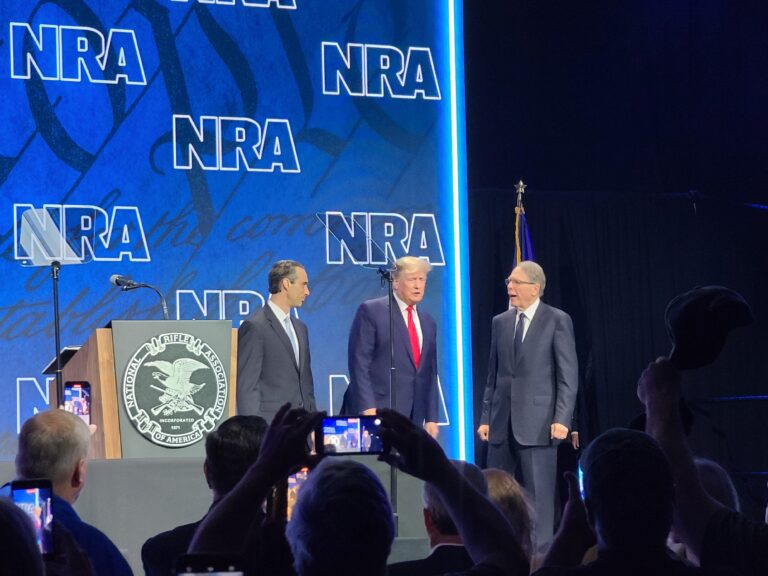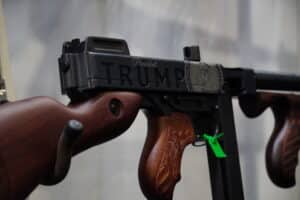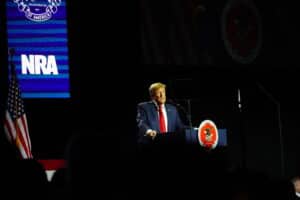Former President Donald Trump (R.) hand waved his decision to unilaterally ban bump stocks in the wake of the Las Vegas shooting as “very unimportant.” But the ban was enormously consequential both legally and politically.
On Wednesday, Trump was asked about his ban by a Republican primary voter at CNN’s town hall.
“As you know, the bump stocks are actually a very unimportant thing,” Trump replied. “NRA I went with them, and they said, ‘it doesn’t mean anything, or actually all they do is teach you how to shoot very inaccurately.’ So, we did that.”
It is true that the National Rifle Association (NRA) supported instituting the ban via executive order after balking at a legislative ban they argued went too far. Trump listened to NRA and issued an order to have the ATF craft a rule banning the devices as unregistered machineguns–possession of which could lead to upwards of ten years in prison under the National Firearms Act (NFA). However, he turned a deaf ear when the NRA complained the rule went too far by refusing to exempt those who’d legally bought the stocks before Trump ordered the rule.
The result was a total confiscation order for bump stocks from the Trump Administration. Despite previously ruling bump stocks were legal to buy without special regulations under the Obama Administration, the ATF declared under Trump the stocks are actually machineguns and aren’t legal to buy and never were. Only destroying the stock you owned or turning it over to the ATF without compensation were offered as remedies to avoiding potential federal felony charges.
The ATF had made its fair share of contradictory or incoherent rules and determinations before the bump stock ban–it had once claimed pressing a pistol-brace-equipped gun to your shoulder constitutes redesigning it on the fly.
However, the bump stock ban was one step further than many of the agency’s previous proclamations. It was based on a lie. One that the Fifth Circuit Court of Appeals has since called out.
A bump stock is a device that helps a shooter to accomplish the bump firing shooting technique–a technique that can be done without the stock or any other modification. It assists the shooter in harnessing a gun’s recoil to actuate the trigger more quickly than would be possible using traditional shooting techniques. But it still requires the trigger to be pressed for every shot.
Under the NFA, a “machinegun” is any gun that can automatically shoot “more than one shot without manual reloading, by a single function of the trigger.”
And that’s where the rub comes in. A bump stock doesn’t fit the definition of a machinegun despite what the Trump Administration said. That was a crucial point in the Fifth Circuit’s ruling that the results of Trump’s executive order were unconstitutional.
“A plain reading of the statutory language, paired with close consideration of the mechanics of a semi-automatic firearm, reveals that a bump stock is excluded from the technical definition of ‘machinegun’ set forth in the Gun Control Act and National Firearms Act,” Judge Jennifer Walker Elrod wrote for the majority in Cargill v. Garland.
Bump stocks were never very popular, though. There were estimated to be a few hundred thousand of the stocks at most. And very few Americans turned them in.
But the practical effect of the bump stock ban extended well beyond enforcement, or lack thereof, during the Trump Administration. It set the template for reclassifying and banning other, even more popular, firearms parts and accessories. The first attempt to do so came at the twilight of Trump’s term when the ATF considered another rule to ban pistol braces.
That one was rejected at the time but resurrected once Trump’s successor came into office. Similarly, President Joe Biden (D.) ordered the ATF to redefine what constitutes a firearm to unilaterally ban the sale of unfinished firearms parts–aka “ghost gun” kits. Biden took the template laid down by Trump with the bump stock ban and expanded it to parts and accessories owned by millions more Americans.
As with Trump’s bump stock ban, it didn’t matter to Biden that the ATF had long said unfinished firearm frames couldn’t be regulated as finished guns or that pistol-brace-equipped guns aren’t NFA items. At the end of this month, American gun owners will now be forced to choose between registering, dismantling, or turning in the gun parts affected by Biden’s rule and facing federal charges.
The bump stock ban did little to help Trump practically or politically when he instituted it. There’s no evidence the ban affected crime in any way. There had only ever been one crime committed with a bump stock–though it was particularly horrific.
The argument for using executive power to institute the bump stock bans was that it would relieve the pressure to respond to the Las Vegas shooting through legislation. While it’s hard to judge exactly how well it worked to that end, the rulemaking process took about a year to complete. By the time it was set to go into effect, the pressure to pass a ban was limited, and Trump received effectively zero credit from gun-control advocates for sticking with it.
In other words, Trump got little or nothing in return politically for instituting his bump stock ban.
This chain of actions and Trump’s continued defense of the ban leaves his right flank open on the issue. And his potential primary rivals have taken note.
Florida Governor Ron DeSantis (R.), who is running second to Trump and is likely to announce a formal campaign shortly, has passed a collection of pro-gun reforms over the past year. He has instituted permitless concealed carry and forced banks not to drop customers over their ownership of guns or gun businesses. This week he banned the use of merchant category codes to track gun retailers.
DeSantis and other potential Republican challengers who’ve enacted pro-gun reforms, such as Georgia Governor Brian Kemp and Texas Governor Greg Abbott, don’t have any liabilities on guns similar to Trump’s bump stock ban.
Republican voters also say they’ll value gun policy highly in the upcoming primary. 66 percent said they want a candidate who “opposes any gun restrictions, according to a recent CBS News/YouGov poll.” Only a candidate who “challenges woke ideas” was rated more important.
Of course, the bump stock ban is not the totality of Donald Trump’s record on guns. Early in his term, he signed a bill repealing an Obama-era rule that would have barred some Social Security recipients from owning firearms. He also declared gun businesses essential during the pandemic, exempting them from some lockdown orders. Most significantly, he appointed three Supreme Court justices on the majority in the 2022 landmark gun ruling New York State Rifle and Pistol Association v. Bruen.
And, certainly, many other factors will go into deciding the next Republican nominee. But there are good reasons to think the bump stock ban is not as “unimportant” in its legal and political effect as Trump claims.







Only Members can view comments. Become a member today to join the conversation.